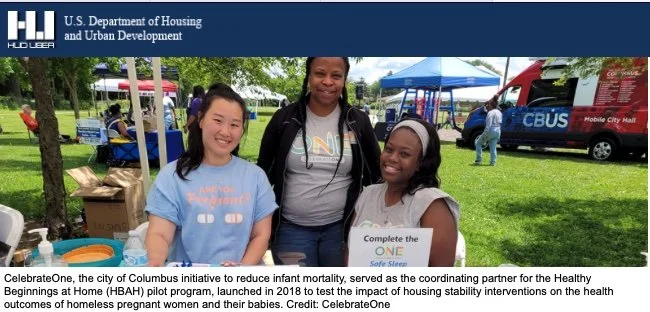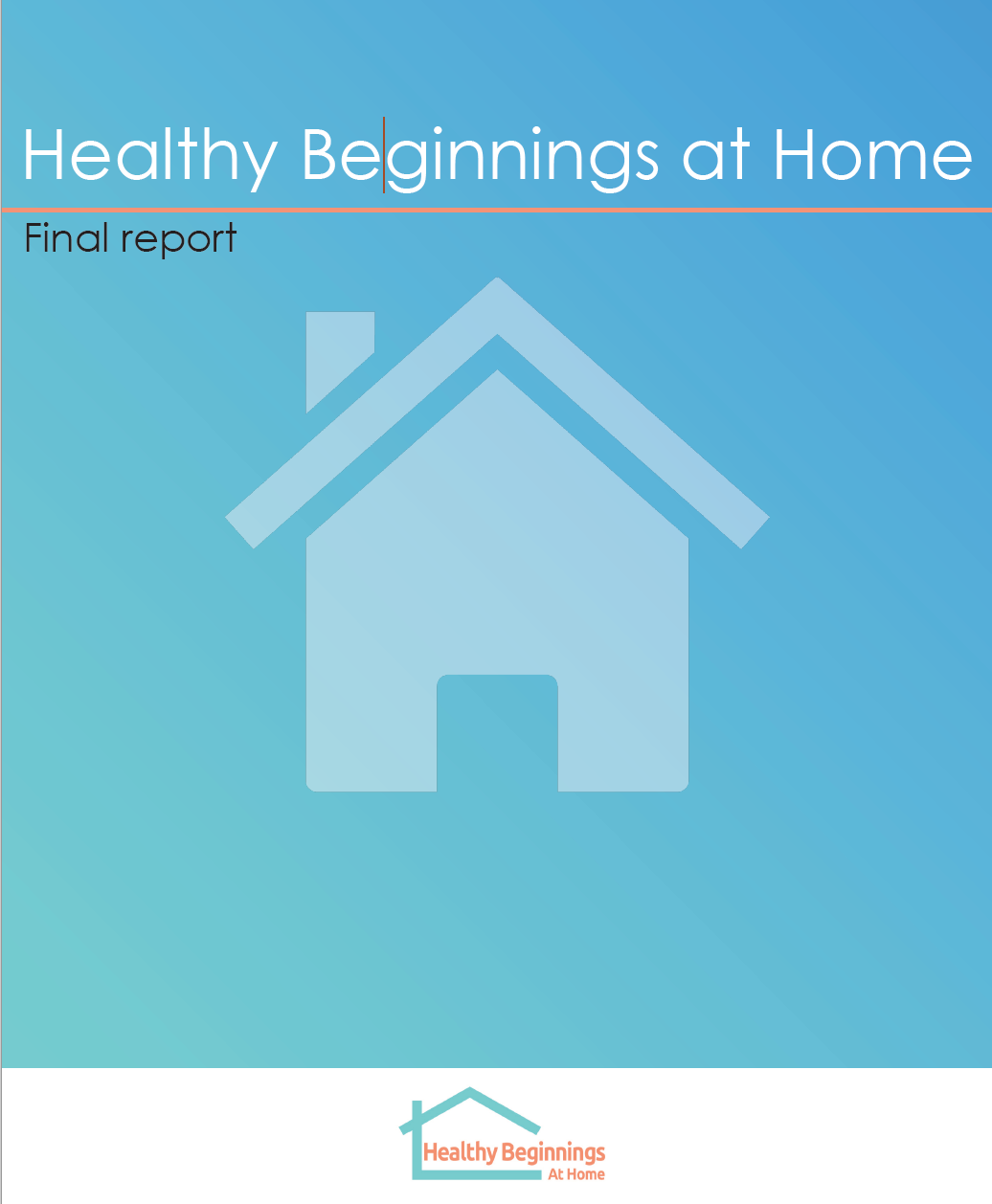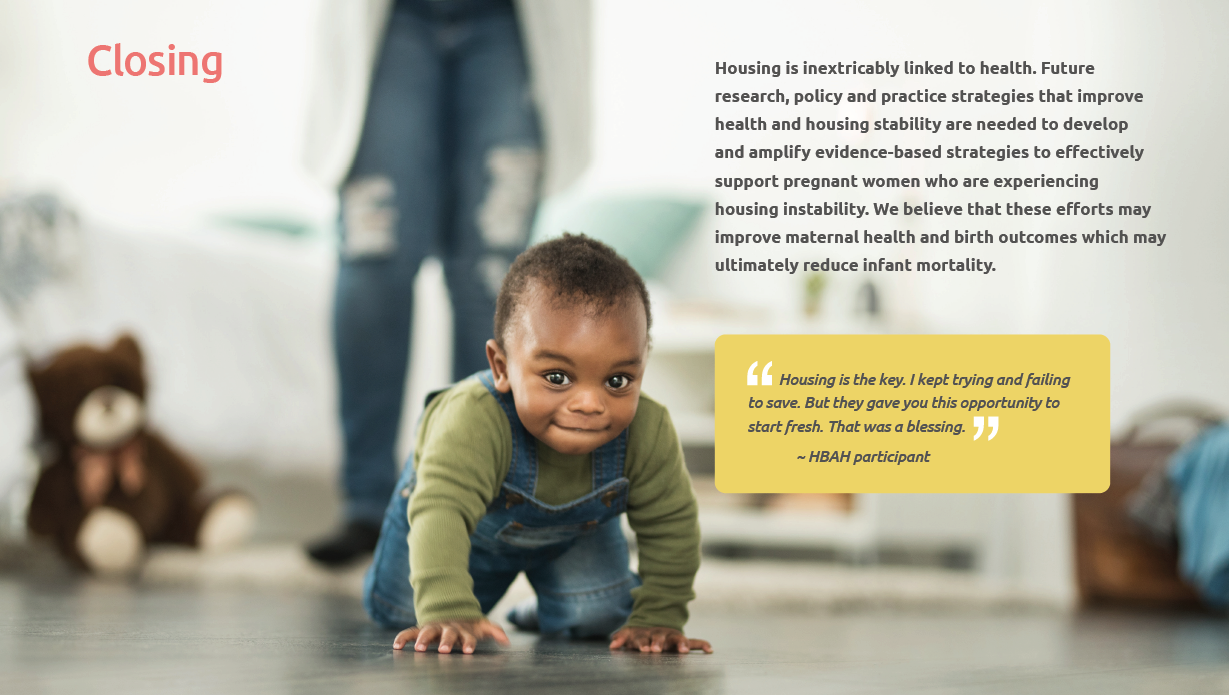Healthy Beginnings at Home (HBAH)
Healthy Beginnings at Home (HBAH) is a research project testing the impact of providing rental assistance with housing stabilization services to pregnant women, who are living in highly unstable housing, and are at greater risk of infant mortality. HBAH is rigorously evaluating its findings to strengthen the evidence for housing stabilization and how it addresses infant mortality, can improve health outcomes for women and their infants. While other studies previously demonstrated the health consequences of families not having housing, HBAH is groundbreaking as it is demonstrating it’s not too late to intervene with housing during pregnancy.
Findings show differences between the birth outcomes for the intervention group and the usual care group. The HBAH collaborative believes there is an opportunity to create a pathway to help more women have healthy babies. The intent is this research could improve birth outcomes by increasing investment in housing across the state and the nation.
The Center for Child Health Equity and Outcomes Research in the Abigail Wexner Research Institute at Nationwide Children’s Hospital summarizes the health outcomes study.
CareSource Foundation received the 2021 HUD Secretary for Public-Private Partnerships for its work to advance Healthy Beginnings at Home.
New Report: Healthy Beginnings at Home Explores a Novel Approach to Reducing Infant Mortality in Columbus, Ohio
Call To Action: Support HBAH Replication
Governor DeWine Awards $2.25 Million to HBAH Collaborative
The Administration awarded $2.25MM to COHHIO to administer the Healthy Beginnings at Home program, which provides rental assistance and housing stability services to pregnant women at high risk of infant mortality. This phase of replication will enroll 90 households from Franklin and Summit counties.
“COHHIO is very pleased to help implement this critically important initiative,” COHHIO Executive Director Bill Faith said. “This grant will show that having a safe, stable home gives babies a healthier start in life, improves family stability, and could even save lives.”
The HBAH Collaborative includes: CelebrateOne, Cradle Cincinnati, Full Term First Birthday Greater Akron/Summit County Public Health, Public Health - Dayton & Montgomery County, CareSource, Coalition on Homelessness and Housing in Ohio, Columbus Metropolitan Housing Authority, Community Shelter Board, Homes for Families, United Way of Summit County, Nationwide Children’s Hospital, Barbara Poppe and Associates, and Health Policy Institute of Ohio.
Maternal and Child Health Journal
“Characteristics Associated with Homeless Pregnant Women in Columbus, Ohio” based on findings from HBAH Phase 1, was published in Maternal and Child Health Journal on October 6, 2021. You can read the article for free here
Abstract
Introduction: The effects of homelessness on pregnant women are substantial. We aim to identify key characteristics of a group of women identified as homeless and pregnant in order to understand their history of housing, family composition, health, and demographics as a first step for future intervention.
Methods: We present cross-sectional survey data on a sample of 100 women reporting homelessness and pregnancy in the prior year in Columbus, Ohio, identified through social service and housing not for profit agencies. Our analysis uses data collected from a survey of health behaviors, housing, employment status, and demographics. Continuous measures are described with means and standard deviations, and categorical variables are described with percentages.
Results: The majority (81%) of the women identified as African American. Over 95% of the women were single, and 74 women reported a prior pregnancy. Almost half of the women reported being behind on rent at least one time in the last 6 months, and 43% indicated that they had lived in more than three places in the last year. Approximately 34% of the sample reported cigarette use during pregnancy, while 12% and 30% reported alcohol and illicit drug use, respectively.
Discussion: Women who were pregnant and experiencing homelessness in our study reported a multitude of complex and severe problems ranging from high rates of substance use, longstanding housing insecurity and financial stress. Programs hoping to successfully support women will need to address a variety of service needs while recognizing the resilience of many women.
Final Report
Compiles all the research components. Health Policy Institute of Ohio, June 2020.
Replication Template
Provides guidance to replicate Healthy Beginnings at Home (HBAH). The components in the template are based on the original model and lessons learned from the initial HBAH implementation in Franklin County, Ohio, led by CelebrateOne in 2018-2021.
Policy Report
Preliminary evaluation and policy recommendations inclusive of baseline and mid-term data on the HBAH research project. Celebrate One, July 2020.
Mid-Term Process Evaluation
Preliminary report that summarizes key findings from the process evaluation. Health Policy Institute of Ohio, September 2020.
Outreach Report
Summarizes interviews with similar organizations in different cities to discuss possible HBAH program replication and expansion in their communities. Barbara Poppe and Associates, March 2021
Health Outcomes
Final report summarizes findings on health outcomes and costs and describes key factors for replication of HBAH. CareSource, March 2021
Presentations
Overview presentation that describes HBAH findings and recommendations. Barbara Poppe and Associates, May 2021
HUD/HHSS Briefing, June 2021
Ohio Budget Advocacy
Groundworks Ohio shared a blog about Healthy Beginnings at Home on their Ready Set Soar Ohio site. This blog is part of our strategy to spread the word about HBAH during the Ohio Budget process.
Podcast
In this episode of the Doorsteps podcast, Dr. Cody Price is joined by CelebrateOne’s Maureen Stapleton and Priyam Khan to discuss the Healthy Beginnings at Home program - a housing stabilization pilot program for pregnant women in Columbus, OH, which found that “women who received housing assistance experienced better birth outcomes than those that did not receive this assistance.” COVID-19 impacts, racial disparities in pregnancy, and Healthy Beginnings at Home 2.0 are also discussed.
Housing and Economic Outcomes Report
This evaluation report examines housing, economic and related outcomes for the 49 women and their households before, during, and at the end of their HBAH participation. The first part focuses on the HBAH participants and their households at the point of HBAH enrollment, providing a profile of demographic, economic and housing-related characteristics that were presented by the fifty pregnant women and their households who enrolled in HBAH and were in some instances compared to fifty other pregnant women and their households that were randomly assigned to a control group that was a key part of the NCH evaluation. The second section occurred at the approximate midpoint of the HBAH program and provides a brief summary of the types of housing, income, and social services provided to the 49 HBAH participants during their program stay. The third section focuses on aggregate housing and economic outcomes for the women and their households as they have concluded, or are preparing to conclude their HBAH participation.
Stephen Metraux, PhD, Center for Community Research & Service, Joseph R. Biden, Jr. School of Public Policy & Administration, University of Delaware. June 2021







